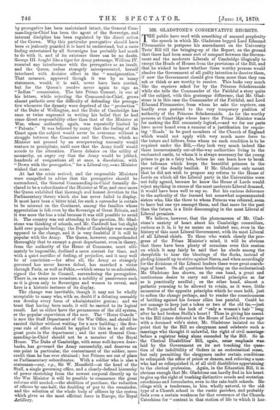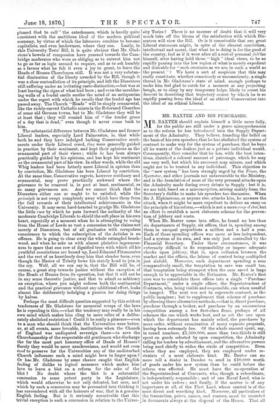MR. GLADSTONE'S CONSERVATIVE REGRETS.
THE public have read with something of amused perplexity- 1. the speech in which Mr. Gladstone begged Lord Edmund Fitztnaurice to postpone his amendment on the University' Tests' Bill till the bringing-up of the Report, an the ground that there had been some sort of compact between the Govern- ment and the moderate Liberals of Cambridge illogically to- except the Heads of Houses from the provisions of the Bill, and that he wished to know whether these worthy persons would absolve the Government of all guilty intention to deceive them,, if now the Government should give them more than they can ask or think or are worthy to receive. This looks very much like the reprieve asked for by the Princess Scheherazade- while she tells the Commander of the Faithful a story quite- off the subject, with this grotesque difference, that Mr. Glad- stone is in this case the Commander of the Faithful, and Lord Edmund Fitzmaurice, from whom he asks the reprieve, can hardly even pretend to the very temporary position of - authority of the Princess Scheherazside. As for the worthy persons at Cambridge whose leave the Prime Minister wants-. for making the Bill commonly logical,—and we for our parts. have never heard even a rumour of a justification for requir- ing 'Heads' to be good members of the Church of England which would not apply with very much more force to .
the tutors and fellows, from whom no such condition is to be required under the Bill,—they look very much indeed like those inconveniently out-of-the-way authorities living in the enchanted castle, to whom it is always necessary for the young prince to go in a fairy tale, before he can learn how to break the talisman which keeps the beautiful princess in the' power of the deadly basilisk. If Mr. Gladstone only meant that he did not wish to propose any reform to the House of Lords on which all the Liberal party in the Universities were- not fully agreed, because he knew the House of Lords would. reject anything in excess of the most moderate Liberal demand, it would have been well to say so. But his curious deference to the authority of the learned but somewhat superannuated: sisters who, like the three to whom Perseus was referred, seem.
to have but one eye amongst them, and that more for the past- than the future, is a little discnuraging in the most Liberal ef Liberal premiers.
We believe, however, that the phenomenon of Mr. Glad-- stone's anxiety of heart about his Cambridge counsellors, curious as it is, is by no means an isolated one, even in the- history of this most Liberal Government, with its most Liberal of all Liberal chiefs. To those who watch closely the pro-- gross of the Prime Minister's mind, it will be obvious- that there have been plenty of occasions even this session, on which it may fairly be said that he abode among the sheepfolds to hear the bleatings of the flocks, instead of girding himself up to strive against Sisera, and when accordingly for the divisions of the Liberal leaders there were great search- ings of heart. On all questions bordering on the ecclesiastical Mr. Gladstone has shown, on the one hand, a great and meritorious desire to carry out Liberal principles as fast- as is practically needful ; on the other hand, almost a pathetic yearning to be allowed to retain, as it were, little- mementos of the opposite principles which he- once held, just to soften the change perhaps, and -to render the consciousness- of battling against his former allies less painful. Could he- not manage to keep just a token or two of the old tie,—just as Swift guarded the lock of "only a woman's hair" long,' after he had broken Stella's heart ? Thus in giving his assent to the Bill (since defeated in the House of Lords),for marriage- with a deceased wife's sister, Mr. Gladstone insisted on the- point that by the Bill no clergyman need celebrate such a- marriage who thought it unlawful, the right of civil marriage- before a registrar being alone conceded by the Bill. So in. the Clerical Disabilities' Bill, again, some emphasis .was laid by the Government on its not touching the quee,-- tion of the indelibility of Orders in an ecclesiastical sense, but only permitting the clergymen u,nder certain .conditions to relinquish the office of priest or deacon, and relieving a maxi- who had so relinquished it, of all civil disabilities appertaining to the clerical profession. Again, in the Education Bill, it is. obvious enough that Mr. Gladstone can hardly find in his heart to give up the right of teaching distinctive creeds and sectarian- catechisms and formularies, even is:Lithe rate-built schools. He- clings with a tenderness, in him wholly natural, to the old( type of a Church school in the rustic parishes, and probably feels even a certain weakness for that reverence of the Church, Catechism for "content in that station. of life to which it hon. pleased God to call" the catechumen, which is hardly quite consistent with the ambitious ideal of the modern political economy, by virtue of which the labourers combine to become capitalists, and even landowners, where they can. Lastly, in this University Tests' Bill, it is quite obvious that Mr. Glad- stone's bowels of compassion have yearned towards the Cam- bridge moderates who were so obliging as to entreat him not to go so far as logic seemed to require, and as to ask humbly as a favour what he felt it even a joy to grant, to leave the Heads of Houses Churchmen still. It was not a very substan- tial diminution of the liberty awarded by the Bill, though it was a clear contradiction of its principle, and left the Dissenters still suffering under an irritating caste-distinction,—but was at least leaving the signs of what had been ; and even the moulder- ing walls of a feudal castle soothe the mind of an antiquarian under the regret with which he recalls that the feudal age has passed away. The Church "Heads" will be simply ornamental, like the richly-carved Catholic saints in the Reformed Churches of some old German towns, but to Mr. Gladstone they will be at least that ; they will remind him of "the tender grace of a day that is dead," even though it never come back to him.
The substantial difference between Mr. Gladstone and former Liberal leaders, especially Lord Palmerston, is, that while both he and they have indulged lurking Conservative senti- ments under their Liberal creed, they were generally guided in practice by their sentiment, and kept their opinions as the ornamental part of their views ; while he has been always practically guided by his opinions, and has kept his sentiment as the ornamental part of his view. In other words, while the old Whig leaders had been latterly more Liberal in opinion than by conviction, Mr. Gladstone has been Liberal by conviction. At the same time, Conservative regrets, however residuary and ornamental, may prove practically awkward where the grievance to be removed is, in part at least, sentimental, as so many grievances are. And we cannot think that the Dissenters either can or ought to be satisfied, while the principle is not swept completely away which bars them from the full rewards of their intellectual achievements in the University. It may seem hard-hearted to grudge Mr. Gladstone the little ruse by which he puts forward the authority of the moderate Cambridge Liberals to shield the soft place in his own heart, especially at a moment when he is attempting to wring from the House of Lords so vast a concession to the claims not merely of Dissenters, but of all graduates with scrupulous consciences to which the subscription of the Articles is an offence. He is going to clear away the whole entangled brush- wood, and when he asks us with almost plaintive ingenuous- ness to spare that one row of dignified trees with which all his youthful associations are bound up, Lord Edmund Fitzmaurice and the rest of us heartlessly deny him that slender boon, even though the Master of Trinity bows his stately head to join in the cry. Well, all we can say is, that the Bill will be, of course, a great step towards justice without the exception of the Heads of Houses from its operation, but that it will not be in any sense theoretic justice, and that to admit so arbitrary an exception, where you might redress both the sentimental and the practical grievance without any additional effort, looks almost like deliberately indulging a passion for doing things by halves. Perhaps the most difficult question suggested by this evident tenderness of Mr. Gladstone for memorial scraps of the laws he is repealing is this,—what the tendency may really be in his own mind which makes him cling to mere relics of a delibe- rately abolished restriction ? Could it be really a pleasure—even to a man who should think that the Universities were better, or, at all events, more loveable, institutions when the Church of England was undisputed sovereign there—to save the Churchmanship of the respectable old gentlemen who discharge the for the most part honorary office of Heads of Houses ? Surely they would be mere anachronisms, and would not even tend to preserve for the Universities any of the undisturbed Church influences such a mind might love to linger upon ? Or has Mr. Gladstone by some chance caught that English feeling of dislike to logical measures which makes him love to leave a blot on a reform for the sake of the blot ? No doubt where the blot is a substantial concession to some potent party in the Legislature, which would otherwise be not only defeated, but sore, and which by such a concession may be persuaded into thinking it has surrendered with all the honours of war, that is a genuine English feeling. But is it seriously conceivable that this trivial exception is such a concession in relation to the Univer- sity Tories? There is no manner of doubt that it will very much take off the bloom of the satisfaction with which Dis- senters will view the Bill. Or is it conceivable that any great Liberal statesman might, in spite of the clearest conviction, intellectual and moral, that what he is doing is for the good of the country, feel as if it were after all a sort of personal fall for himself, after having held those " high " ideal views, to be so rapidly passing into the low region of what is merely expedient and desirable for "such creatures as we are, in such a world as the present " ? We have a sort of suspicion that this may really constitute, whether consciously or unconsciously, a single thread in Mr. Gladstone's state of mind, enough perhaps to make him feel glad to catch for a moment at any projecting bough, or to cling by any temporary ledge, likely to arrest his descent in describing that trajectory course by which he is so rapidly passing from the ideal of an ethical Conservative into the ideal of an ethical Liberal.































 Previous page
Previous page